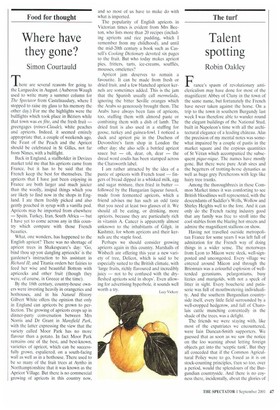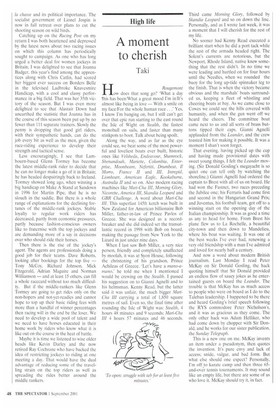Talent spotting
Robin Oakley
France's spasm of revolutionary anticlericalism may have done for most of the magnificent Abbey of Cluny in the town of the same name, but fortunately the French have never taken against the horse. On a trip to the town in southern Burgundy last week I was therefore able to wander round the elegant buildings of the National Stud, built in Napoleon's time with all the architectural elegance of a leading chateau. Alas the precision of my mental notes was somewhat impaired by a couple of pastis in the market square and the copious quantities of St \reran which accompanied the subsequent pique-nique. The names have mostly gone. But there were pure Arab sires and the begetters of trotting-horse dynasties as well as huge grey Percherons with legs like hairy tree trunks.
Among the thoroughbreds in these Common Market times it was comforting to see British bloodlines well represented, with the descendants of Saddler's Wells, Wollow and Shirley Heights well to the fore. And it can only do the French racing industry good that any family was free to stroll into the cool stables from the blazing hot streets and admire the magnificent stallions on show.
Having not travelled outside metropolitan France for some years l was left full of admiration for the French way of doing things in a wider sense. The motorways from Lyon to Macon were sleek, well-signposted and uncongested. Every village we entered around Macon and through the Brionnais was a colourful explosion of welltended geraniums, pelargoniums, busy tizzies and marigolds, with not a speck of litter in sight. Every boucherie and patisserie was full of mouthwatering individuality. And the southern Burgundian countryside itself, every little field surrounded by a well-cropped hedgerow, and full of Charolais cattle munching contentedly in the shade of the trees. was a delight.
The friends we were staying with, like most of the expatriates we encountered, were lain Duncan-Smith supporters. We guessed that as soon as we saw the notice on the loo warning about letting foreign objects get into the 'sceptic tank'. But they all conceded that if the Common Agricultural Policy were to go, based as it is on stock-counting principles, then so too, over a period, would the splendours of the Burgundian countryside. And there is no coyness there, incidentally, about the glories of
la chasse and its political importance. The socialist government of Lionel Jospin is now in full retreat over plans to cut the shooting season on wild birds.
Catching up on the Racing Post on my return I was both heartened and depressed by the latest news about two racing issues on which this column has periodically sought to campaign. As one who has long urged a better deal for women jockeys in Britain, I was delighted to see that Joanna Badger, this year's find among the apprentices along with Chris Catlin, had scored her biggest ever success on Borders Belle in the televised Ladbroke Knavesmire Handicap, with a cool and classy performance in a big field. That was her 35th victory of the season. But I was even more delighted to see that Alastair Down had unearthed the statistic that Joanna has in the course of this season been put up by no fewer than 111 separate trainers. Slowly the penny is dropping that good girl riders, with their sympathetic hands, can do the job every bit as well as the men, given the race-riding experience to develop their strength and tactical sense.
Less encouragingly, I see that Lambourn-based Glenn Tormey has become the latest middle-rank rider to decide that he can no longer make a go of it in Britain; he has headed despairingly back to Ireland. Tormey showed long ago, when winning a big handicap on Make A Stand at Sandown in 1996 for Martin Pipe, that he is no slouch in the saddle, But there is a whole range of explanations for the declining fortunes of the middle-rank jockeys. Stable loyalty to regular work riders has decreased, partly from economic pressures, partly because fashion-conscious owners like to fraternise with the top jockeys and are demanding more of a say in decisions over who should ride their horses.
Then there is the rise of the jockey's agent. The agents are professionals doing a good job for their teams. Dave Roberts, looking after bookings for the top five — Tony McCoy, Richard Johnson, Mick Fitzgerald, Adrian Maguire and Norman Williamson — and at least 15 others, can fill a whole racecard without too much difficulty. But if the middle-rankers like Glenn Tormey are going to get rides only on the non-hopers and not-yet-readies and cannot hope to top up their basic riding fees with more than a handful of winner percentages then racing will in the end be the loser. We need to develop a wide pool of talent and we need to have horses educated in their home work by riders who know what it is like out on the course in the heat of battle.
Maybe it is time we listened to wise older heads like Kevin Darley and the now retired Ray Cochrane who have backed the idea of restricting jockeys to riding at one meeting a day. That would have the dual advantage of reducing some of the travelling strain on the top riders as well as spreading the rides better around the middle rankers.



























































 Previous page
Previous page